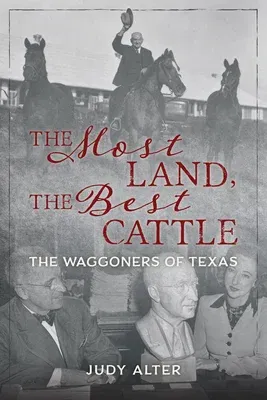In the 19th century, Daniel Waggoner and his son, W.T. (Tom), put
together an empire in North Texas that became the largest ranch under
one fence in the nation. The 520,000-plus acres or 800 square miles
covers six counties and sits on a large oil field in the Red River
Valley of North Texas. Over the years, the estate also owned five banks,
three cottonseed oil mills, and a coal company. While the Waggoner men
built the empire, their wives and daughters enjoyed the fruits of their
labor. This dynasty's love of the land was rivaled only by their love of
money and celebrity, and the different family factions eventually
clashed. Although Dan seems to have led a fairly low-profile life, W. T.
moved to Fort Worth, became a bank director, built two office buildings,
ran his cattle on the Big Pasture in Indian Territory (Oklahoma), hosted
Teddy Roosevelt at a wolf hunt in the Big Pasture, and sent Quanah
Parker to Washington, D.C., for Roosevelt's inauguration. W. T. had two
sons, Guy and E. Paul, and a daughter named Electra, the light of his
life. W. T. built a mansion in Fort Worth for her--today the house, the
last surviving cattle baron mansion on Fort Worth's Silk Stocking Row,
is open to the public for tours and events. Electra, an international
celebrity and extravagant shopper (she once spent $10,000 in one day at
Neiman Marcus), died at the age of forty-three. Guy had nine wives; his
brother E. Paul, partier and horse breeder, was married to the same
woman for fifty years and had one daughter, Electra II. Electra II was a
both a celebrity and a talented sculptor, best known for a heroic-size
statue of Will Rogers on his horse, Soapsuds, as well as busts of two
presidents and various movie stars. After marriage to an executive she
settled in a mansion at the ranch and raised two daughters. This
colorful history of one of Texas's most influential ranching families
demonstrates that it took strength and determination to survive in the
ranching world...and the society it spawned.

